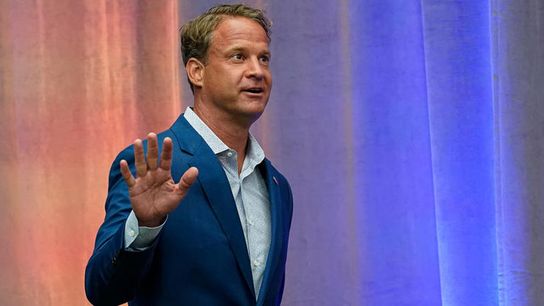Southeastern Conference boss Greg Sankey said Monday the college athletics marketplace “calls for action” as programs, especially those in the Southeastern Conference, cope with the year-old, brand-new reality of Name, Image & Likeness deals in concert with prospective student-athletes’ college choices.
Lane Kiffin?
Well, wearing no ties and telling no lies, Kiffin plainly stated what the sport – or college athletics’ revenue sports – need.
And like many of his peers have relayed to FootballScoop, Kiffin believes that head coaches need to be involved in the new world of NIL.
“Ideally, I would think that the coach should be part of managing that,” Kiffin said during Monday’s opening day of the SEC’s annual Kickoff media days. “That's how you'd want it done. But I don't know if it will be that way or whatever.
“So that's just how I would do it. That's based off of look what happens in professional sports. There's salary caps. The coach and the general manager/owner manage that.”
Kiffin then transparently discussed the current format – in which most programs and even some state laws – prohibit schools and their personnel from being directly involved. And yet other states, such as Tennessee, as well as Florida and California, have open laws that allow school officials to be involved in the deal-making process.
“The other thing about that, too, if it's not [going to be an environment with coach and school involvement], say, ‘OK, why would you put it that way when coaches aren't supposed to be involved in that?’,” Kiffin said inside the College Football Hall of Fame in downtown Atlanta. “You have a whole other set of problems. If you have boosters out there deciding who they're going to pay to come play, and the coach isn't involved in it, how does that work? They could go pick who they want, pay him however much.
“Are the boosters going to tell you who to play, too? When they don't play, how is that going to work out?”
Right now, per Kiffin, the key to a successful NIL platform that helps programs land potential difference-makers rests out of control – direct control, that is – of schools and their personnel.
“Well, the first question is the keys to NIL and how do you well with that; you have really good boosters,” Kiffin said. “That's how you do well at it. I'll say what other people say, as you know.
“It's like a payroll in baseball. What teams win over a long period of time? Teams that have high payrolls and can pay players a lot. We're in a situation not any different than that. I'm sure other people said it. I said Day 1, you legalize cheating, so get ready for the people that have the most money to get players. Now you have it. It is what it is.”
And what the current situation is, as both Kiffin and Sankey alluded to, is an unchecked system – one that prompted Brian Kelly in his first-ever SEC Kickoff appearance earlier Monday to declare that his LSU program isn’t getting “outbid” for players.
“As far as a general manager to manage that, we aren't allowed in the current system to manage what they make,” Kiffin said. “We're not there yet. I don't know that we ever will be. That's just what I said it should be because that's what any other professional sport, which is what we are now, does.”
